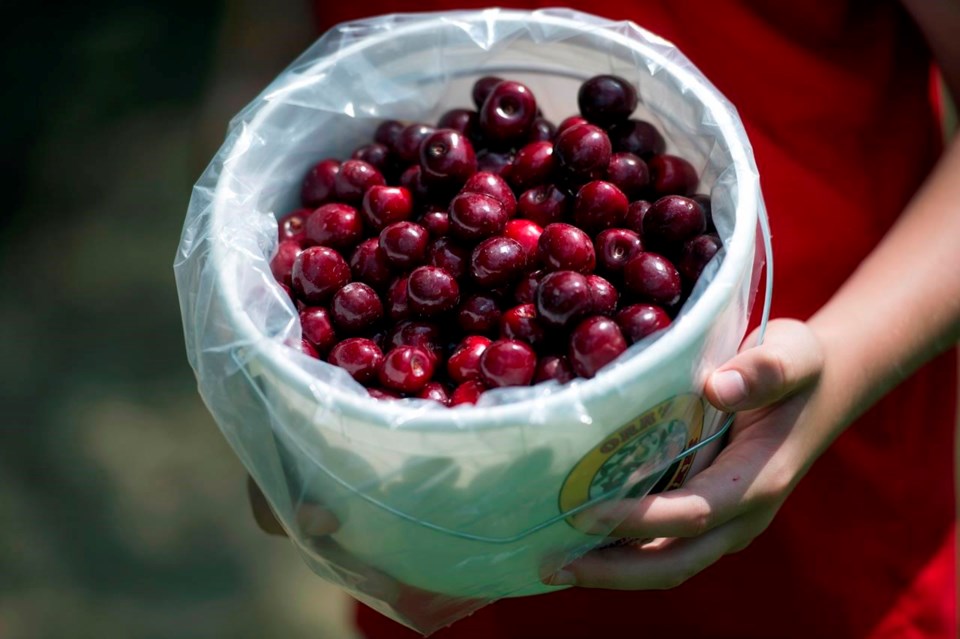KELOWNA, B.C. — This season will likely be the most challenging cherry growers have ever experienced in British Columbia, a farmer and industry leader says, after a widespread cold snap damaged trees and buds last month.
Sukhpaul Bal, president of the BC Cherry Association, said the deep freeze was especially destructive because temperatures were mild in the preceding weeks.
The cherry trees had no time to develop hardiness to withstand temperatures that dipped below -30 C in parts of the southern Interior, where most of B.C.'s cherries are grown, and the buds couldn't cope with the sudden drop, he said.
"We've seen -25 here in Kelowna and the Okanagan. We're not saying we've never seen cold. But it's a different type," said Bal, who runs Hillcrest Farm in Kelowna.
"If you have plus five degrees for weeks on end, and then within three, four days you're down to -25, -30, naturally, that's going to be an issue."
Bal's association issued a statement this week saying cherry growers are "reeling" from the Jan. 12 cold snap, which threatens to "dramatically reduce" their crop.
There won't be a full picture of the losses and damages until cherries begin to blossom, some time between April and May, Bal said in an interview on Wednesday.
But an analysis of samples collected after the cold snap doesn't bode well.
"Unfortunately, some of our growing areas in the Okanagan and Creston, farmers have been hard pressed to find any live buds within those," Bal said.
For those with extensive damage, it would be a "best-case" scenario to lose this year's crop but emerge with healthy trees in 2025, he said.
Still, the financial impact on farms is "huge" when a crop gets wiped out, he added.
Bal said it's too early to say what the impact will be on crops in 2025 and beyond.
"But it is certainly possible that trees in the worst hit areas have suffered long-lasting damage with a recovery that could take years," he said in the statement.
Bal said the effects of the deep freeze are made worse by the fact it came while cherry growers are still recovering from a cold snap in 2020 and a heat dome that shattered temperature records throughout the province in June 2021.
"This is the one that's kind of done us in," he said.
"We just haven't had a chance to recover and bounce back from other events."
Bal said this year marks the first time his association is approaching government to ask for additional support as growing cherries is becoming "next to impossible."
The cherry industry has pursued support through government programs, he said, but some of the funding is tied to the insurance value of the crops. It's a "downward spiral" of support as growers see one bad season after another, Bal said.
"We wanted to bounce back and come out of this on our own, but now we're signalling to the government that this is almost an impossible task."
Prior to 2020, Bal said there were perhaps three "short crops" in B.C.'s cherry industry due to cold weather, but they were spread out over two decades.
As the climate changes, he said extreme temperatures and fluctuations are becoming increasingly frequent and severe in his community and beyond.
Bal likened the plight of the cherries to "the canary in a coal mine," since the industry has been seen as a "bright light" in Canadian agriculture.
A news release from Agriculture and Agri-Food Canada in 2022 said the growth of the cherry industry has been a "major success story," with cherries becoming the country's second-largest exported fruit crop behind blueberries.
Canada's exports of sweet cherries reached $78 million in 2021, with B.C. farmers producing 95 per cent of that volume, the statement said.
Bal said when cherry growers are struggling with potentially devastating losses, it signals the need for greater support for agricultural producers who have been hit hard by wildfires, flooding, heat waves and drought over the last several years.
Seasonal outlooks so far point to the likelihood for continued drought, he noted.
Bal is worried about the mental health of cherry growers in the province as conditions seem to get "worse and worse," he said.
— By Brenna Owen in Vancouver
This report by The Canadian Press was first published Feb. 14, 2024.
The Canadian Press



